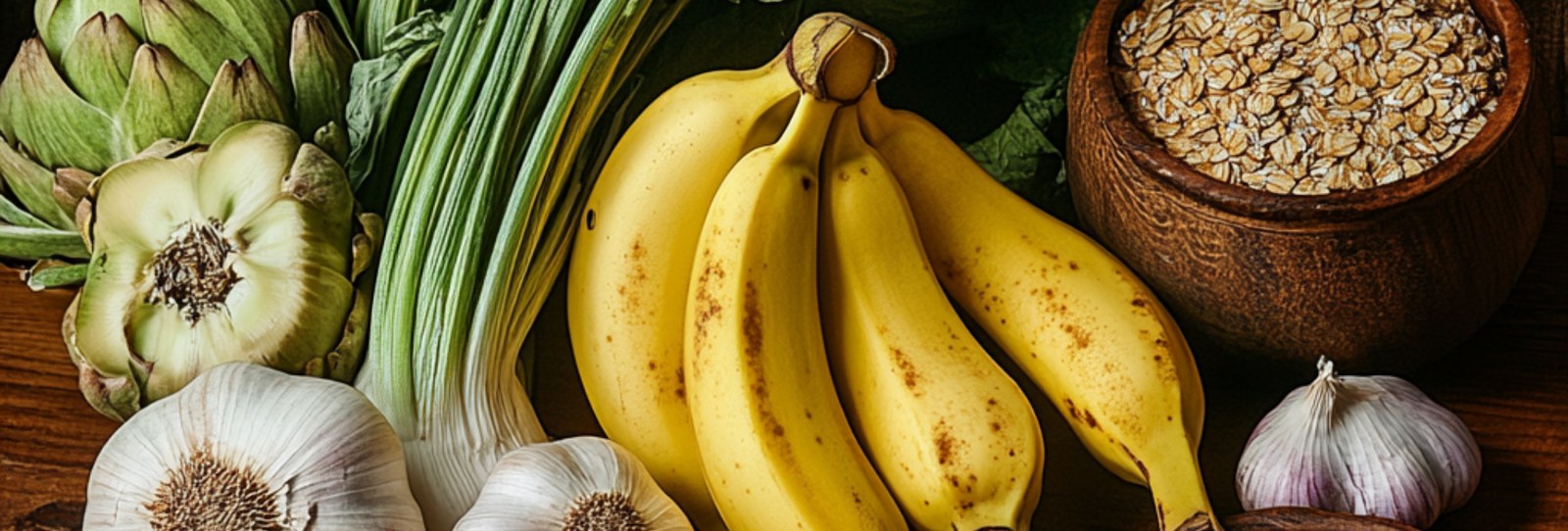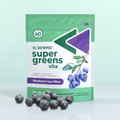
by Erika Albertini, PT, DPT August 21, 2024 8 min read
Imagine there’s a natural ingredient that could supercharge your gut health, improve digestion, help you manage your weight, lower your blood sugar, and even boost your energy levels. Sounds too good to be true, right? Well, what if I told you that this powerhouse ingredient is already hiding in some of your favorite fruits and veggies?
Yep, I’m talking about inulin—a dietary fiber that’s been flying under the radar but is finally getting the attention it deserves. Whether you’re into green powder drinks or just looking to add a little extra something to your daily routine, inulin could be the game-changer you didn’t even know you needed. Ready to find out why everyone’s buzzing about it? Let’s dive in!
Inulin is a type of soluble fiber that our bodies don’t digest in the small intestine. Instead, it travels to the large intestine, where it serves as food for beneficial bacteria, acting as a prebiotic. Unlike some fibers that just bulk up stool, inulin actually helps cultivate a healthier gut environment.
Inulin is found in plants like:
When you consume inulin, it reaches your colon intact because our bodies lack the enzymes to break it down in the stomach or small intestine. Once in the colon, it’s fermented by the gut bacteria, which then produce short-chain fatty acids (SCFAs). These SCFAs have numerous health benefits, including enhancing the absorption of certain minerals like calcium, improving gut health, and even supporting immune function.
But before we dive into the science-backed benefits of inulin, let’s take a quick trip back in time to understand its origins.
Inulin has been around far longer than most of us realize. This soluble fiber, found naturally in over 36,000 plants, was first identified in 1804 by German scientist Valentin Rose in the roots of plants like chicory and dandelion.
However, the use of inulin-rich plants goes back much further. Ancient Egyptians used chicory root as a medicine, and Native Americans relied on Jerusalem artichokes as a staple food. Over time, as our understanding of gut health has evolved, inulin has come to be recognized not just for its nutritional value but also for its powerful prebiotic properties.
Inulin is a prebiotic fiber, which means it plays a crucial role in promoting a healthy gut. When you consume inulin, it isn’t digested by the stomach or small intestine. Instead, it reaches the colon intact, where it becomes food for beneficial bacteria like Bifidobacterium and Lactobacillus. These good bacteria are essential for maintaining a healthy gut environment, supporting digestion, and even bolstering your immune system.
In addition to promoting gut health, inulin has been shown to improve constipation by softening stools and promoting regular bowel movements. In fact, studies have shown that inulin can relieve constipation and improve specific quality-of-life measures related to gut health.

If you’re trying to manage your weight, inulin might be your new best friend. Because inulin is a type of fiber, it helps you feel fuller for longer, reducing the likelihood of overeating. Research has shown that people who consume inulin tend to have a lower calorie intake throughout the day. Additionally, inulin can improve fat oxidation, which means your body can burn fat more efficiently.
Inulin also plays a role in regulating lipid metabolism, which can help lower blood cholesterol levels. This effect, combined with inulin’s ability to stabilize blood sugar, makes it a powerful tool in managing weight and reducing the risk of lifestyle-related diseases like type 2 diabetes and atherosclerosis.
Inulin doesn’t just support digestion and weight management—it also has potent anti-inflammatory properties. By modulating the gut microbiota, inulin helps reduce inflammation throughout the body, which is crucial for preventing chronic diseases. For example, inulin has been shown to alleviate endotoxemia (a condition where toxins from the gut enter the bloodstream) and reduce inflammation associated with obesity and type 2 diabetes.
Even more impressively, inulin has been linked to a reduced risk of colon cancer, breast cancer, and other types of tumors. It does this by influencing gut bacteria and promoting the production of short-chain fatty acids, which protect against cancerous changes in the colon.
Inulin is also beneficial for bone health. It enhances the absorption of essential minerals like calcium and magnesium, which are crucial for maintaining strong bones and preventing osteoporosis. This is especially important as we age, as maintaining bone density becomes increasingly vital.
By increasing the solubility of these minerals in the digestive tract, inulin ensures that your body can absorb and utilize them effectively. Pairing inulin with a greens drink mix rich in vitamins and minerals could be a winning combination for long-term health.
Believe it or not, the health of your gut can directly impact your mental well-being. Research suggests that inulin might play a role in relieving depression and improving mood. This is likely due to the gut-brain axis—a communication network that links your gut and brain. By promoting a healthy gut microbiome, inulin can influence the production of neurotransmitters like serotonin, which are vital for maintaining a positive mood.

While inulin has many benefits, it’s important to note that it can cause some side effects, especially if consumed in large amounts. Some people may experience gas, bloating, or discomfort as their bodies adjust to the increased fiber intake. To avoid these issues, it’s best to start with a small amount of inulin and gradually increase your intake.
Additionally, if you have a FODMAP intolerance or certain gastrointestinal conditions, you should consult with your healthcare provider before adding inulin to your diet. Inulin may also interact with certain medications, so it’s always a good idea to check with your doctor if you’re on any long-term prescriptions.
If you’re convinced about the benefits of inulin, you might be wondering how to start incorporating it into your diet. The good news is that it’s easier than you think!
Many super greens powders and green drink mixes already contain inulin, so you’re getting the benefits of this amazing fiber along with a host of other nutrients. When you’re choosing a greens powder, be sure to check the label for inulin among the ingredients—it’s a great sign that the product will support your gut health and overall wellness.
The best part about these powders is how versatile they are. You can blend them into a smoothie for a delicious, nutrient-packed breakfast or snack. If you’re short on time, just mix a scoop with water, juice, or plant milk for a quick and easy health boost. And if you’re feeling creative in the kitchen, super greens powders can be added to a variety of recipes—think pancakes, energy balls, or even your morning oatmeal—for an extra dose of greens. The options are endless, and no matter how you choose to enjoy them, you’re making a tasty choice that supports your health.
Inulin is naturally found in foods like chicory root, garlic, dandelion greens, asparagus, and bananas. Adding these to your meals can boost your inulin intake.
Inulin supplement capsules are available if you want to ensure you’re getting a consistent amount each day.
Remember, when you start increasing your inulin intake, do so gradually. Because it’s a fiber, too much too soon can cause gas and bloating. Start with small amounts and slowly work your way up to avoid any discomfort.

I’ve been using Rewind Greens super greens powder, which has the benefits of inulin, among other great nutrients, and I’ve noticed a real difference in my health and energy levels. Since incorporating it into my daily routine, I’ve felt more energized, had better gut health, and just overall healthier. It’s amazing how adding this one supplement has had such a positive impact on my well-being. The blend of nutrients in Rewind Greens has really supported my digestion and kept me feeling great throughout the day.
Inulin may not be the most talked-about ingredient in the world of health, but its benefits are undeniable. From supporting digestion to aiding in weight management, reducing inflammation, and even lowering the risk of certain cancers, inulin is a powerful addition to any diet. Whether you’re sipping on a green powder drink or enjoying a healthy greens powder in your morning smoothie, inulin can help you take your health to the next level.
If you’re curious to try inulin for yourself, why not start with one of our super greens powders at Rewind Greens? You’ll not only be fueling your body with essential nutrients, but you’ll also be supporting your gut health in a way that’s both delicious and effective.
1. What is inulin, and how does it work?
Inulin is a type of dietary fiber that acts as a prebiotic, feeding the good bacteria in your gut. It helps improve digestion, supports weight management, and boosts overall gut health.
2. Can inulin help with weight loss?
Yes, inulin can aid in weight loss by promoting feelings of fullness, regulating blood sugar levels, and improving fat oxidation. It’s a great addition to any weight management plan.
3. Are there any side effects of consuming inulin?
Some people may experience gas, bloating, or discomfort, especially if they consume too much inulin too quickly. It’s best to start with small amounts and gradually increase your intake.
4. How does inulin affect blood sugar levels?
Inulin can help lower blood sugar levels by slowing down the digestion of carbohydrates. This leads to fewer blood sugar spikes and a more stable energy level.
5. Can I get inulin from whole foods?
Yes, inulin is found in many whole foods like chicory root, garlic, onions, and bananas. It’s also available in supplements and is often added to super greens powders and green drink mixes.
Qin, Y., Wang, L., Yang, X., Xu, Y., Fan, G., Fan, Y., Ren, J., An, Q., & Li, X. (2023).Inulin: properties and health benefits.Food & function.
Beek, C., Canfora, E., Kip, A., Gorissen, S., Damink, S., Eijk, H., Holst, J., Blaak, E., Dejong, C., & Lenaerts, K. (2018).The prebiotic inulin improves substrate metabolism and promotes short-chain fatty acid production in overweight to obese men.Metabolism: clinical and experimental, 87, 25-35.
Shoaib, M., Shehzad, A., Omar, M., Rakha, A., Raza, H., Sharif, H., Shakeel, A., Ansari, A., & Niazi, S. (2016).Inulin: Properties, health benefits and food applications.Carbohydrate polymers, 147, 444-454.
Ahmed, W., & Rashid, S. (2019).Functional and therapeutic potential of inulin: A comprehensive review. Critical Reviews in Food Science and Nutrition, 59, 1 - 13.
Nair, K., Kharb, S., & Thompkinson, D. (2010).Inulin Dietary Fiber with Functional and Health Attributes—A Review.Food Reviews International, 26, 189 - 203.
Kaur, N., & Gupta, A. (2002).Applications of inulin and oligofructose in health and nutrition.Journal of Biosciences, 27, 703-714..
Li, L., Wang, Y., Zhu, L., Liu, Z., Ye, C., & Qin, S. (2020).Inulin with different degrees of polymerization protects against diet-induced endotoxemia and inflammation in association with gut microbiota regulation in mice.Scientific Reports, 10.
Bastard, Q., Chapelet, G., Javaudin, F., Lepelletier, D., Batard, E., & Montassier, E. (2019).The effects of inulin on gut microbial composition: a systematic review of evidence from human studies. European Journal of Clinical Microbiology & Infectious Diseases, 39, 403 - 413.
Hiel, S., Gianfrancesco, M., Rodriguez, J., Portheault, D., Leyrolle, Q., Bindels, L., Cauduro, C., Mulders, M., Zamariola, G., Azzi, A., Kalala, G., Pachikian, B., Amadieu, C., Neyrinck, A., Loumaye, A., Cani, P., Lanthier, N., Tréfois, P., Klein, O., Luminet, O., Bindelle, J., Paquot, N., Cnop, M., Thissen, J., & Delzenne, N. (2020). Link between gut microbiota and health outcomes in inulin -treated obese patients: Lessons from the Food4Gut multicenter randomized placebo-controlled trial.Clinical nutrition.
Vandeputte, D., Falony, G., Vieira-Silva, S., Wang, J., Sailer, M., Theis, S., Verbeke, K., & Raes, J. (2017).Prebiotic inulin-type fructans induce specific changes in the human gut microbiota. Gut, 66, 1968 - 1974.
Li, K., Zhang, L., Xue, J., Yang, X., Dong, X., Sha, L., Lei, H., Zhang, X., Zhu, L., Wang, Z., Li, X., Wang, H., Liu, P., Dong, Y., & He, L. (2019).Dietary inulin alleviates diverse stages of type 2 diabetes mellitus via anti-inflammation and modulating gut microbiota in db/db mice.Food & function, 10 4, 1915-1927.


Cherry Delight Vita
$49.99

Pineapple Dream Vita
$49.99

Blueberry Acai Bliss Vita
$49.99